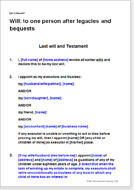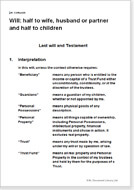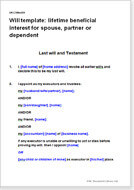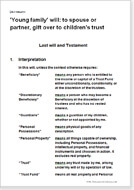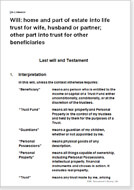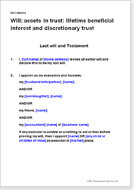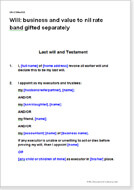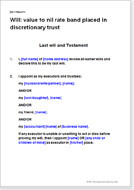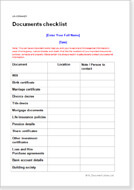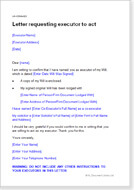Make your last Will and testament
Your Will is one of the most important legal documents you make in your life. Using Net Lawman is an easy way of ensuring your wishes are carried out and that your possessions are passed on as you wish, whether your affairs are simple or complicated.
For more information, read about where to start when making a Will.
Simple will with gift over
A simple last will and testament to leave the whole of your estate to someone else, or to a charity, or shared between a group of people such as your children.
For example, you may be:
- married, leaving all possessions to a husband, wife or partner, or
- widowed, leaving all assets to an adult son or daughter, or
- single without children, and leaving all assets to a family member or a co-habiting partner
The template allows you to nominate another person else to receive your estate if your primary beneficiary dies before you.
The document is:
- simple to understand and simple to prepare and sign
- free to download and use
We include extensive guidance notes, explaining clearly how to edit the document and how to sign the will correctly, and a short example letter of intent to your executors.
Will: to one person after legacies and bequests
This free template creates a last will and testament where the testator leaves all his or her assets to one person after making specific gifts of money and possessions.
For example, you may be:
- a parent or grandparent, leaving an estate to a husband, wife or partner after having made gifts to children, extended family members and/or charities, or
- a single person, who wishes to leave specific gifts to friends and family and the rest of the estate to one person, equally to his or her children, or to a charity
You may make as many gifts to individuals or classes of people as you like.
The template allows you to nominate another person to receive your estate if your primary beneficiary dies before you.
It also includes options for giving gifts to minors by passing the gift directly to a parent or by creating a trust
The document is:
- simple to understand and simple to prepare and sign
- free to download and use
We include extensive guidance notes, explaining clearly how to edit the document and how to sign the will correctly, and a short example letter of intent to your executors.
Will: half to wife, husband or partner and half to children
A flexible template to create a last will and testament suitable for the majority of circumstances.
After whatever gifts you make, the residue of your estate is divided between two or more people in shares you specify.
For example, you might be:
- a parent, leaving the majority of your estate to your husband, wife or partner and the remainder (after specific gifts), or
- a widowed grandparent, leaving your estate to your adult children and to your grandchildren (perhaps on trust because one or more is under 18 years old), or
- a single parent, who wishes to leave most of your estate to family members but also leave some to charity or to a friend
A key feature of this template is that you can set flexible trust provisions, giving you greater control of how the trustees should administer your estate, and making trust management easy.
There are also options to leave gifts to minors without creating a trust.
You may also:
- appoint guardians
- nominate someone else to receive your estate if your first choice of beneficiary dies before you
The document is:
- easy to prepare
- free to download and use
We include extensive guidance notes, explaining clearly how to edit the document and how to sign the will correctly, and a short example letter of intent to your executors.
Will template: lifetime beneficial interest for spouse, partner or dependant
This will template allows you to support someone (such as a spouse or partner) for the rest of his or her life, by letting him or her use certain assets (such as a house) without passing ownership. When that person dies, the estate is divided between others.
Use this template:
- for basic inheritance tax planning (largely as illustrated by HM Revenue and Customs)
- to control who ultimately benefits from the estate (for example, to ensure children from earlier relationships are not disinherited)
You can set trust provisions in detail, giving you a high level of control of how the trustees should invest and manage your estate for both the 'life tenant' and the ultimate beneficiaries.
You may also make specific gifts to individuals so that some or all the beneficiaries receive something immediately after your death, and not only on the death of the 'life tenant'.
'Young family' will: to spouse or partner, gift over to children's trust
This family will has been designed for parents of young children.
It could also be used by a grandparent leaving their estate to an adult son or daughter with a young family.
On your death, the estate passes entirely to one person, or into a discretionary trust for young children if that beneficiary does not succeed you by a certain number of days.
Use of a discretionary trust rather than a 'bare' one has a number of advantages:
- entitlements can be rearranged within 2 years, allowing post death tax planning
- allocation does not have to be on an even basis - some beneficiaries could be given a greater share than others
- trustees have discretion (which you can guide in a letter of intent) as to how to use the estate. For example, you could direct that it should be used to help support those who want to go to university
- benefit can be maintained without giving ownership in situations where ownership could erode value. For example, your share of a family company could be left in a discretionary trust so that your children only become shareholders (controlling how it is run) once they have sufficient experience.
Note though that many of the tax benefits of discretionary trusts have now been removed.
Of course, the template also allows you to appoint guardians.
Will: home and part of estate into life trust for wife, husband or partner; other part into trust for other beneficiaries
This will template should be used by someone who wishes to take good care of a dependant (such as a partner, spouse or disabled adult child) without giving the share of the estate to that person so that children or others ultimately have the capital.
The will creates three trusts:
- two to support a life beneficiary: one containing your share of the house, the other containing a proportion of your estate
- one for other beneficiaries containing the remainder of the estate
The template uses Net Lawman trust provisions, giving you control over how the trustees should administer the trusts for both the 'life tenant' and the other beneficiaries.
You may also make specific gifts that will be passed immediately on your death to who you intend to own them.
Will: assets in trust: lifetime beneficial interest and discretionary trust
This will template allows you to place your estate, after specific gifts, into two trusts:
- one that has a life beneficiary (to allow someone to benefit from use of those assets during his or her lifetime, but for those assets to be passed on to others of your choosing on death - for example, to ensure children from earlier relationships are not disinherited)
- one that is a discretionary trust (for inheritance tax planning)
There are options to leave private company shares or a partnership interest.
The most likely user would be a business owner who has remarried, but who has children from earlier relationships and does not want to 'disinherit' them.
The use of a discretionary trust makes this template suitable if some beneficiaries (such as young children or dependents) are not yet financially responsible.
You can set trust provisions in detail, deciding how the trustees should manage your property for both the 'life tenant' and the ultimate beneficiaries.
You may also make specific gifts to individuals so that beneficiaries receive something immediately after your death, and not only on the death of the 'life tenant'.
Will: business and value to nil rate band gifted separately
This is a straightforward will for someone who owns shares in a private company or who has a share in a partnership.
After specific gifts have been made, business interests are gifted to a person such as a sibling or adult child.
Further assets up to the nil rate band are given to other beneficiaries.
The residual estate is given to one 'primary' beneficiary, such as a spouse or partner, with provision for gift over if that person does not survive you.
There is an option for gift over to trust or discretionary trust for another group of beneficiaries if your first choice does not survive you by more than a given time.
Small bequests and legacies to minors can be made without involving a trust.
Will: value to nil rate band placed in discretionary trust
Use this will if you have a young family or dependents who are not yet financially responsible.
After specific gifts have been made, private company shares and business partnership interests are left as gifts to one person or party such as a sibling or adult child.
The will establishes a discretionary trust up to the value of the nil rate band at the time of your death to protect assets for one set of beneficiaries (such as your children until they reach the age of 18). This has advantages of:
- entitlements can be rearranged within 2 years, allowing post death tax planning
- different beneficiaries can receive different amounts
- trustees have discretion (which you can guide in a letter of intent) as to how to use the estate
- benefit can be maintained without giving ownership in situations where ownership could erode value
Note that there are no longer tax benefits to using discretionary trusts.
Flexible trust provisions allow you to specify how the trust fund should be managed and spent.
The remainder of the residual estate is apportioned between named beneficiaries (such as your spouse or partner and your children) in proportions you choose. Beneficiaries can be the same as those listed for discretionary trust.
Documents checklist
A checklist that you can complete to tell your executors and family where they might find important documents and personal information that will make the process of sorting out your affairs easier.
Letter requesting executor to act
A template letter asking someone to be an executor of your estate.

If the document isn’t right for your circumstances for any reason, just tell us and we’ll refund you in full immediately.

We avoid legal terminology unless necessary. Plain English makes our documents easy to understand, easy to edit and more likely to be accepted.

You don’t need legal knowledge to use our documents. We explain what to edit and how in the guidance notes included at the end of the document.

Email us with questions about editing your document. Use our Lawyer Assist service if you’d like our legal team to check your document will do as you intend.

Our documents comply with the latest relevant law. Our lawyers regularly review how new law affects each document in our library.
Why you should make a Will
You should consider making a Will whether you are young or old, if you have a family to look after, or if you own a property or other valuable assets.
If you die intestate, that is if you don’t have a proper Will in place, then your money and personal property might not be distributed in the way you intend.
Making a Will gives you peace of mind and confidence that:
- minor children (under 18) will be looked after, emotionally and financially
- family disputes over the distribution of your assets will be avoided
- the people you trust to sort out your affairs after your death can do so
- that your money and possessions will be left to the people you want, even when there are complicated situations such as poor health, divorce and financial problems
Our comprehensive service
Net Lawman provides last Will and testament templates that you can download and edit on your computer.
If you would like peace of mind that your wishes will be carried out, we can review your edited document.
In some cases, we may be able to draft your Will completely for you.
What our Wills cover
Our Wills include the following provisions, as far as each is needed:
Revocation of previous Wills
Your last Will and testament by definition is the most recent. However, the first lines of any Will usually revoke (cancel) any previous Wills you might have made.
Appointment of executors
An executor is a personal representative who carries out your wishes in your Will.
In your Will, you can nominate up to four people to work together as your executors. They are appointed through the process of obtaining a grant of probate when you die.
We also allow you to nominate alternatives if your first choices are unable or unwilling to take up the position.
Appointment of Guardians for your children under 18 years
For detailed information about choosing guardians with parental responsibility for your children, we recommend that you read our article on providing for later generations.
Gifts of money and possessions (legacies and bequests) to individuals
You can make as many gifts to individuals as you like. These may include real and personal property, money in bank accounts, or other assets including digital assets.
When you give specific gifts, they are deemed to be free of tax. That means if tax is due on your estate, it is paid using the money and assets that you have not already given away (your 'residual estate'). So you need to make sure that you do not accidentally deprive those closest to you by making too large gifts to less important people.
If you make a gift of real property, such as your house or a piece of land, you should make sure that you own it outright, or as a ‘tenant in common’. If you own the real property with co-owners as a ‘joint tenant’, then it will automatically pass to them. You can read more about the difference between joint tenancy and tenants in common.
Gifts to charities
In law, a charity is simply another person. So just as you can leave a gift of money to a family relative, you can leave a gift to any charity.
Options for giving gifts to minors
If a beneficiary is under 18 when you die, then the law automatically places his or her gift in trust until he or she reaches 18. For small gifts, especially to minors who are not your own, you may want to avoid the administrative burden that managing a trust would place on your executors, and give the gift to the parents instead, either to keep on behalf of the child or to use as they choose (for the child).
Options for leaving the residual estate
In most templates, you can choose to leave:
- everything to one person
- everything in equal shares between a group of people
- specific shares to specific individuals
We also include a gift-over provision allowing you to nominate alternative beneficiaries for the gift of the residual estate.
Payment to executors
The law says that an executor may not accept payment for his work unless the Will expressly authorises it. But if you want a professional executor, they will usually act only if they are paid for his time. So we always provide a simple sentence authorising professional executors to be remunerated.
It would be most unusual for a family member acting as an executor to demand to be paid for their time, but they could reasonably ask for repayment of expenses.
Directions for valuation of your estate
After your death, it is unlikely that those closest to you will be thinking hard about the cost of winding up your estate. However, they may require professional valuations of certain assets to satisfy HMRC. The professionals who provide these valuations generally charge far more than they would dare to charge you if you were alive. In all but the simplest Wills we provide an instruction by you to stop this happening.
Funeral wishes
Strictly, you do not legally own your own dead body and, therefore, cannot specify what should happen to it. However, if you make your funeral wishes clear in your Will, it is most likely that your executors and relatives will carry them out.
Repayment of funeral expenses take precedence over the payment of gifts.
An example letter of intent
A letter of intent is a side letter that is not part of your Will and not binding. However, executors tend to follow the instructions you give in it. A letter of intent gives you an opportunity to cover business arrangements and personal matters in depth. It is not registered, unlike your Will is, so no-one except your personal representatives needs ever know its contents.
Trust provisions
You can create a trust on purpose or by operation of law such as when you leave a gift to minor children under 18. Trusts are a complicated concept. You can read more about trusts in Wills.
We use our own trust provisions adapted from the Standard Provisions of the Society of Trust and Estate Practitioners (STEP).
Our provisions give you maximum flexibility and control of how any trust is managed, freeing the trustees from some of the bonds of the Trustee Act 2001 that are unsuitable for a trust managed within your family.
Life interests and property protection
Trusts that create life interests are used to control ownership of the assets you place into the trusts. The beneficiaries may use the assets during their lifetimes (or subject to other conditions) after which the trusts are dissolved and ownership of the assets passes to other people you choose.
The most common use is to provide security for a partner or second wife or husband during her or his lifetime, but for the assets eventually to pass to children, some of whom might be from earlier marriages and who otherwise might be accidentally disinherited if the entire estate passed to your second wife.
Use of an inheritance tax nil-rate band discretionary trust
Tax is payable only on the value of your estate above a certain amount. This amount is called the threshold or the nil rate band.
There used to be tax advantages to using a discretionary trust and placing assets valued up to the value of the nil-rate band into it. Those tax advantages are no longer so advantageous, but using a discretionary trust can protect your personal property from claims by creditors or in divorce settlements or if your husband or wife remarries.
Who can make a Will
Most adults can (and should) make a Will.
For a Will to be legally valid, the person making it must be:
- of legal age (over the age of 18)
- of sound mind
- not under undue influence or pressure from another person
In addition, the Will must be attested correctly. It must be signed and dated by the person making it, in front of two witnesses who print their names and addresses.
Using Net Lawman templates
Easy to understand and edit
Like all our documents, our Wills are written in plain English. This not only makes editing easy, but also makes it more certain that your wishes are followed. Complicated and unusual words may make the document sound more impressive but they do not add to the legality of the document.
Only where absolutely necessary do we use words that have a particular meaning in law.
We follow the normal, modern legal convention of using the masculine form of a word regardless of the gender of the person. The documents are equally as suitable for women as for men.
Edit in your favourite word processor
All our documents are in Microsoft Word format, which is compatible with many other word processors including Mac Pages, LibreOffice and WordPerfect. We can provide copies in other formats on request.
Our guidance notes help you create a perfect document
Guidance notes are provided with each last Will and testament template. These explain how to edit the document and provide extensive information about why we include each paragraph and the decisions you might need to make.
Making your Will legally binding
Once you have finished editing the document, you need to print, date and sign your Will to make it binding. We explain exactly how to do that in the guidance notes that we provide with the template, and in our article about signing your Will to make it binding.
No need to use a solicitor
You do not need a solicitor or Will writer to review or to approve your Will for it to be legally binding.
The document becomes binding as a result of the process of signing it in front of two witnesses, not because of the involvement of a solicitor in preparing or reviewing it.
If you need specific legal advice, that is an 'opinion' about how the law applies to your circumstances, you might approach a law firm regulated by the Solicitors Regulation Authority. However, unless you think that your wishes are contentious and will be challenged at probate or if you have personal posessions and property overseas, the advice you need may be practical rather than legal.
You might also seek estate planning or tax advice from a financial planner or accountant if you want to minimise the amount of tax eventually paid. However, this is not a requirement.
When to write or rewrite your Will
You can write a Will at any time. Most people consider a new Will when their financial circumstances change, or when relationships change. The Law Society advises that you review your Will every five years and that you make a new Will after a major life change such as having a child, marriage, separation or divorce.
It is possible to change a Will without making a new one, but amending a previous Will is more difficult than making a new one.
Why we provide some templates for free
Our motivations for providing completely free Will templates are both ethical and commercial.
A Will is an important legal document, and we believe that everyone should make one. Because the law sets out how your personal property is divided if you don't have a Will, without one, the people you care about are less likely to receive specific gifts (whether of financial or sentimental value) that you want to pass on to them.
The reason why most people don't write a Will is the financial cost of doing so. We want to remove that barrier. Our free templates are most suitable for less complicated estates that are valued below the IHT nil rate band (when no tax would be paid). One of the Net Lawman free Will templates should be suitable, we estimate, for about 60% of the UK population.
Our commercial motivation is simply that once you have used a Net Lawman Will, we hope that you come back to us for legal documents for other aspects of your personal or business affairs. Providing a complete, commonly used, free template that is based on our more complex paid versions is a great way for our visitors to assess the quality of our documents.
Note that our free templates do not contain provisions that seek to minimise tax. If this is important to you, you should look at the other Net Lawman last Will and testament templates, a number of which cover basic IHT planning (largely as illustrated by HM Revenue and Customs). If the valuation of your estate could exceed the nil rate band (£325,000 for an individual in 2022/23), then we suggest that you seek advice from a qualified tax specialist before signing your Will.
Easy to navigate and helpful products and templates
*****
Tracey L
All rights reserved


